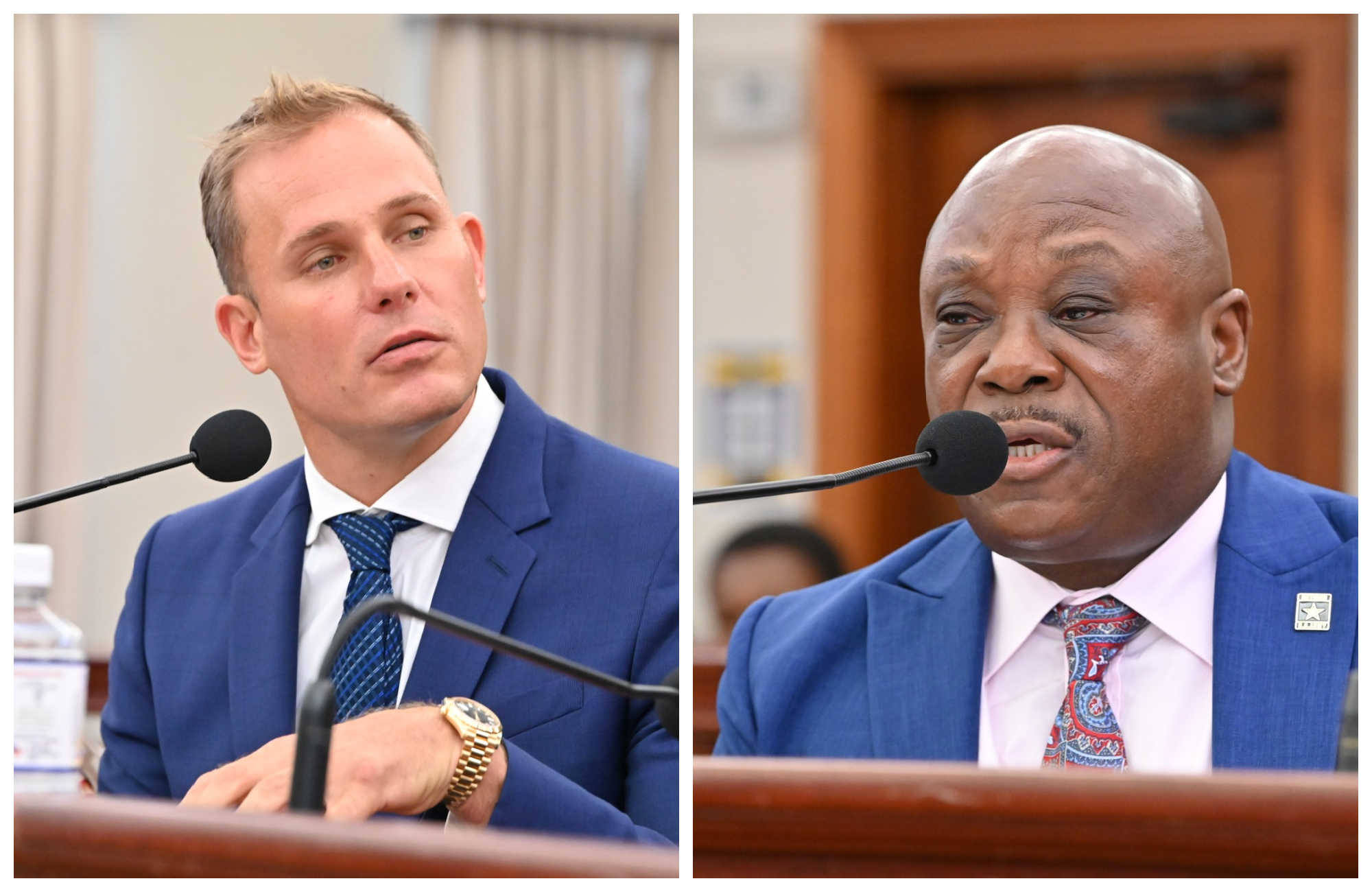Senate
Proposal for Separate Horse Racing Commissions in St. Croix and St. Thomas Advances in Senate

The proposition to undo the merger of the V.I. Horse Racing Commission is one step closer to fruition. This follows the endorsement of draft legislation, championed by Senator Samuel Carrion, by the Senate committee.
The 35th Legislature’s Committee on Culture, Youth, Aging, Sports, and Parks convened this past Friday. They not only took into account the ongoing rejuvenation of the territory’s dual race tracks but also held discussions on the suggested bills.
Senator Carrion clarified the intent behind the proposed legislation. Rather than abolishing the prevailing Virgin Islands Horse Racing Commission, Bill 35-0083 aims at setting up individual horse racing commissions for each district. This move is anticipated to bolster localized representation and governance. “Distinct commissions guarantee that the concerns and voices from each district get the attention they deserve. It also amplifies inclusivity as members from each district can directly influence policies specific to their horse racing community,” expressed Mr. Carrion.
Complementing the aforementioned bill, Bill 35-0073 delves into the roles and responsibilities of the horse racing commission, ensuring transparency and seamless decision-making processes. Mr. Carrion explained that this legislation has been crafted in light of evolving circumstances. Originally, a solitary commission was deemed sufficient due to the presence of one promoter overseeing both premier racetracks in the Virgin Islands. Current situations, however, deviate from this arrangement, hence, as per the Senator’s viewpoint, the push for district-specific commissions.
Post the Senator’s briefing, the gathered testimony showcased a wide array of opinions about the reinstatement of individual commissions.
Chairperson of the Horse Racing Commission, Hugo Hodge, presented his reservations, stating, “A single commission covering the entire territory promotes efficiency, simplifies scheduling, and ensures uniform rules.” Similarly, Calvert White, Commissioner of Sports, Parks, and Recreation, voiced his objections.
However, Elroy Bates Jr., president of the Flamboyant Park Horsemen Association, highlighted concerns about unequal representation within the Territorial Horse Racing Commission. To this, Mr. White suggested a solution: “A better approach might be filling the vacant seat rather than splitting.”
Clinton Hedrington, leading the St. Thomas/St. John Horsemen Association, shifted the debate’s focus towards the need for uniform regulations across districts. “Our primary aspiration is the standardization of rules and regulations,” he commented.
Jay Watson, who once served the Horse Racing Commission, pushed for tighter reins on unregulated horse racing, emphasizing adherence to federal norms. Steering the conversation with Senator Franklin Johnson, he accentuated, “The core issue isn’t district favoritism. The real question is – how do we nurture the horse racing sector in every district? To be frank, this potential largely resides in St. Croix, known as the Big Island, given its expansive area suited for such an industry.”
Wrapping up the discussions, Senator Carrion put forth an amendment to Bill 35–0073. This would mandate the new associations to disclose quarterly profit and loss reports. The amendment, as well as both bills, received approval, except from Senator Francis Heyliger. The proposals now await the scrutiny of the Committee of Rules & Judiciary.
Senate
Conn Davis II and Lindel Williams, Nominated to Waste Management Board, Impress Lawmakers

Governor Albert Bryan Jr.’s nominees, Conn Davis II and Lindel Williams, have garnered significant support from lawmakers on the Committee on Rules and Judiciary for their appointments to the Waste Management Authority (WMA) Board of Directors.
Both nominees come with substantial financial management backgrounds and expressed a strong commitment to enhancing waste management systems. During the committee meeting on Thursday, they articulated their vision for a more efficient and effective waste management infrastructure in the Virgin Islands.
Conn Davis II, poised to represent St. Thomas on the board, brings experience as a financial trader and has worked with companies focused on converting waste to clean energy. “I’ll bring a great work ethic, strong financial and operational expertise, and a deep global business network to the V.I. Waste Management Authority,” Davis assured legislators. He emphasized that waste management is “one of the most fundamental and essential functions of government.”
Davis advocated for a thorough assessment of the current waste management scenario, incorporating best practices, and setting clear goals. He stressed the importance of accountability to various stakeholders, including staff, citizens, vendors, contractors, and the U.S. Environmental Protection Agency. Additionally, Davis proposed exploring creative funding mechanisms, such as an advanced disposal fee on incoming goods at ports of entry, as an alternative to the existing tipping fees.
Lindel Williams, nominated to represent St. Croix, is a military veteran with international engineering and construction experience. As a former commissioner of the Department of Public Works, he oversaw waste management operations. Williams highlighted the necessity of accountability to the public, compliance, and responsible use of public funds. He also pointed out the need for innovative financing, including public-private partnerships.
Williams outlined several goals, including employee training, rebranding the WMA as a desirable workplace, repairing the sewer system, building new pump stations, and improving landfill management. Lawmakers were particularly impressed with his ability to manage multi-million dollar portfolios.
During the hearing, senators posed various questions regarding the nominees’ strategies for wastewater management, reducing green waste, long-term plans, public education, and waste collection fees. Davis emphasized the importance of changing public perceptions of waste management, linking it to health, beautification, and tourism. Williams agreed, highlighting the need for robust public education to shift mindsets.
Despite awaiting formal confirmation, both nominees offered numerous suggestions to improve waste management. Senator Kenneth Gittens praised their financial expertise, stating, “the Virgin Islands does not have a money problem, but rather a money management problem.” He urged the nominees to leverage their skills to enhance the authority’s operations and proposed new legislation to improve the WMA and ensure a cleaner, healthier environment in the territory.
Senate
Bill Allowing Government Employees to Seek Public Office Without Taking Leave Defeated in Senate

Another attempt by Senator Marise James to pass legislation permitting government employees to seek political office while employed by the Government of the Virgin Islands (GVI) has stalled. The motion to move the bill forward during Thursday’s meeting of the Committee on Rules and Judiciary failed as her colleagues did not second it.
Proponents argue that the defeat of this legislation maintains a significant barrier for government employees wishing to enter politics. Currently, they must take unpaid leave to run for office, leading to financial and professional instability. This requirement discourages many potential candidates, thereby limiting competition and benefiting incumbent lawmakers who face less competition.
Bill 35-0032, introduced last September, would allow employees to seek office while employed unless prohibited by federal or other laws. The bill faced substantial opposition from lawmakers, including Senators Kenneth Gittens and Carla Joseph, over concerns about conflicts of interest, misuse of taxpayer dollars, and potential policy violations.
Amendments were recommended, including changes by Elections Supervisor Caroline Fawkes and Chief Justice Rhys Hodge. The chief justice advised excluding judicial branch employees from the bill, citing strict guidelines on their political activity. Although Senator James complied with this request and considered other amendments, the latest version of the bill was not shared with invited testifiers nor posted on the Legislature’s website as of press time.
Senator James argued that requiring government employees to vacate their posts to run for office is unfair and disrupts government operations, especially during election cycles. She suggested that her proposal would increase the pool of candidates and reduce the financial burden of campaigning.
While invited testifiers generally supported the amended measure, they suggested further refinements. Ms. Fawkes recommended changing the start of mandatory leave for government employees contesting political office to the absentee ballot casting date rather than the first day of early voting, as the latter is flexible and varies each election cycle.
Despite some support, the bill faced overwhelming opposition from lawmakers. Senator Angel Bolques Jr. expressed concerns about potential issues and ambiguities, while Senator Franklin Johnson worried about conflicts of interest between official duties and political ambitions. Senator Kenneth Gittens reiterated his skepticism, fearing that the bill might encourage misuse of government resources.
The motion to advance the proposal out of committee did not receive a second, leaving Senator James “speechless.” Despite this setback, she emphasized the need to avoid the financial hardship associated with campaigning and expressed hope that future efforts might succeed in changing the law.
Bill 35-0032 remains in the Committee on Rules and Judiciary at the chair’s call.
Senate
Jurors, Witnesses to Receive Increased Payments if Proposed Measure Becomes Law

The Senate Committee on Rules & Judiciary has advanced a proposal aimed at increasing compensation for jurors and witnesses in the Virgin Islands. Currently, jurors receive $50 per day under federal law, while witnesses receive $40. Local statutes, dating back to 1957, offer witnesses only $4 to $8 per day, and local courts established in 1976 pay jurors $40 per day, plus $5 for transportation costs.
Bill 35-0121 proposes increasing these rates to $80 per day for jurors, payable in $40 half-day increments. Jurors who participate in selection but are not chosen will receive $20 per day, a point of contention for Senator Marise James, who argues for equal compensation for all jurors. Additionally, the bill includes provisions for reasonable compensation for travel, parking, and a subsistence allowance for meals and lodging.
Government employees are excluded from these payments. Witnesses would also receive $80 per day for court attendance, plus a $100 allowance for subsistence, travel time, and inter-island travel costs if they live outside the district where the court proceedings are held.
Senator Novelle Francis, co-sponsor of the bill, emphasized the financial burden jury service imposes on citizens, which can hinder the ability to form a diverse jury. Chief Territorial Public Defender Julie Todman supported the measure, stating that adequate juror compensation is crucial for maintaining a robust judicial system. She highlighted the American Bar Association’s stance that juror compensation should cover routine expenses such as travel, parking, meals, and childcare. This measure, she noted, would elevate the Virgin Islands from one of the lowest to one of the highest in juror compensation.
Deputy Attorney General Ian Clement voiced support for the bill but pointed out that the proposed legislation lacks clarity on who will fund the increased payments and suggested that local government employees should not receive payments when testifying on behalf of the government. He also questioned the exclusion of federal employees from these payments.
Regina Peterson, Administrator of Courts for the Judiciary of the Virgin Islands, proposed that the new pay rate should be a minimum threshold, allowing adjustments for inflation and cost of living. She also noted the projected doubling of jury service costs to approximately half a million dollars annually, to be included in the judiciary’s upcoming budget submission. Ms. Peterson clarified that while the judiciary handles jury compensation, witness payments are the responsibility of the party calling the witness.
Jessica McKinney, chair of the Legislation and Law Reform Committee of the Virgin Islands Bar Association, recommended aligning the juror payments with the current minimum wage, raising the base to $84 per day to maintain consistency. She suggested further adjustments to enhance the bill’s flexibility.
Despite calls for language amendments, Bill 35-0121 passed unanimously in committee, with further discussions expected to refine and strengthen the legislation.
-

 Education1 year ago
Education1 year agoEducation Board Seeks Input on Schools Through Comprehensive Survey
-

 Education2 years ago
Education2 years agoCTE Board Enthusiastic About New Curriculum Standards, Yet Anxious Over Apprenticeship Support
-

 Crime2 years ago
Crime2 years agoRegistered Sex Offender Detained for Illegal Firearm Possession During Annual Surveillance Drive
-

 Videos3 years ago
Videos3 years ago2022 Gubernatorial Election: Voters Speak Out
-

 Development1 year ago
Development1 year agoCosts Surge as Donoe Estates Housing Project Resumes with New Contractor
-

 Videos3 years ago
Videos3 years agoGubernatorial Teams Celebrate St. Croix’s Bull & Bread Day
-

 Videos3 years ago
Videos3 years agoWakanda’s Female Might: A Dive into ‘Black Panther: Wakanda Forever’
-

 Crime2 years ago
Crime2 years agoSt. John’s Westin Resort Scene of Armed Robbery, Prompting Heightened Police Vigilance




